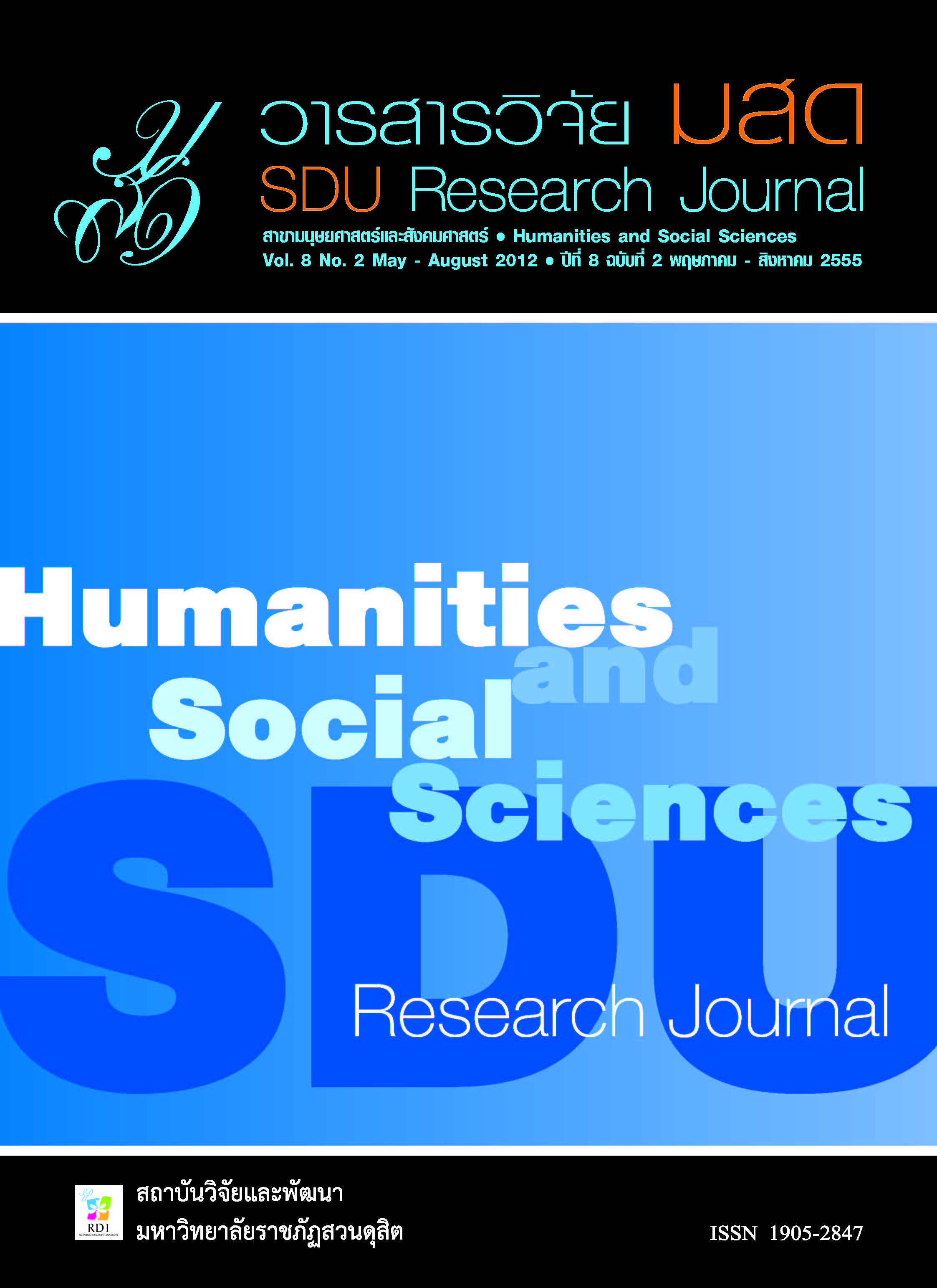The Effects of Using Peer Feedback through Email with Students of Limited English Proficiency in an EFL Writing Class
Keywords:
การให้ข้อมูลป้อนกลับจากเพื่อนผ่านทางอีเมล์, การสอนการเขียน, ผลสัมฤทธิ์ทางการเขียน, peer feedback through email, writing instruction, writing achievementAbstract
บทคัดย่อ
การวิจัยครั้งนี้มีวัตถุประสงค์เพื่อศึกษาผลการนำข้อมูลป้อนกลับจากเพื่อนผ่านทางอีเมล์มาใช้กับนักศึกษาที่มีระดับสมรรถนะภาษาอังกฤษระดับอ่อน ในชั้นเรียนการเขียนภาษาอังกฤษเป็นภาษาต่างประเทศ และศึกษาเจตคติของนักศึกษาที่มีต่อการใช้ข้อมูลป้อนกลับจากเพื่อนผ่านทางอีเมล์ รูปแบบการทดลองเป็นงานวิจัยเชิงเดี่ยวซึ่งมีการเปรียบเทียบคะแนนผลสัมฤทธิ์ทางการเขียนก่อนและหลังการทดลอง โดยวิธีการให้ข้อมูลป้อนกลับจากเพื่อนผ่านทางอีเมล์เป็นตัวแปรต้น และผลสัมฤทธิ์ทางการเขียนเป็นตัวแปรตาม ประชากรคือนักศึกษาคณะครุศาสตร์ สถาบันเทคโนโลยีพระจอมเกล้าพระนครเหนือ ที่ลงทะเบียนเรียนวิชา การเขียน 1 เป็นวิชาเลือก ภาคการศึกษา 2/2551 จำนวน 40 คน โดยกลุ่มตัวอย่างในการศึกษาครั้งนี้ ได้แก่ นักศึกษาคณะครุศาสตร์ที่มีระดับสมรรถนะภาษาอังกฤษระดับอ่อนจำนวน 24 คน ซึ่งได้จากการสุ่มตัวอย่างอย่างง่ายจากผลการเรียนวิชาภาษาอังกฤษ 1 และภาษาอังกฤษ 2 เพื่อให้มั่นใจว่านักศึกษาสามารถให้ข้อมูลป้อนกลับต่องานเขียนของเพื่อนได้อย่างมีประสิทธิภาพ ดังนั้นนักศึกษาจึงได้รับการฝึกวิธีการให้ข้อมูลป้อนกลับเป็นเวลา 6 ชั่วโมงในช่วงต้นของการเรียนการสอน โดยการวิจัยครั้งนี้ เครื่องมือที่ใช้ในการเก็บข้อมูลเชิงปริมาณได้แก่ ข้อสอบวัดผลสัมฤทธิ์ทางการเขียน และแบบสอบถามแบบปลายปิด ส่วนการเก็บข้อมูลเชิงคุณภาพได้ใช้แบบสอบถามแบบปลายเปิด และวิธีการสัมภาษณ์ สถิติที่ใช้ในการวิเคราะห์ข้อมูล ได้แก่ สถิติแบบพรรณนา และ t-test ผลจากการวิจัยพบว่า คะแนนผลสัมฤทธิ์ทางการเขียนภาษาอังกฤษของนักศึกษาเฉลี่ยก่อนการทดลองและหลังการทดลองมีความแตกต่างกันอย่างมีนัยสำคัญทางสถิติที่ระดับ 0.05 หลังจากใช้ข้อมูลป้อนกลับจากเพื่อนผ่านทางอีเมล์ และนักศึกษามีเจตคติที่ดีต่อการนำข้อมูลป้อนกลับจากเพื่อนผ่านทางอีเมล์มาใช้ในการเรียนวิชาการเขียนภาษาอังกฤษ
คำสำคัญ : การให้ข้อมูลป้อนกลับจากเพื่อนผ่านทางอีเมล์, การสอนการเขียน, ผลสัมฤทธิ์ทางการเขียน
Abstract
This research study aims to investigate peer feedback through email with students of limited English proficiency in an EFL writing class. It also aims to explore their attitudes towards the use of peer feedback through email. The study was conducted using a single group, peer feedback through email as well as a pre-test and post-test. The population of this study was 40 undergraduate education students who enrolled in Writing I as an elective course at King Mongkut’s University of Technology North Bangkok (KMUTNB). 24 students of limited proficiency who received low grades of English I and English II were randomly chosen as subjects. Before the research study, the subjects were trained on how to provide effective peer feedback for 6 hours. The research instruments for quantitative data collection were a writing achievement test and close-ended questionnaire. The qualitative data were gathered from an open-ended questionnaire and interviews. Descriptive statistics and a t-test were used to analyze the data. The results revealed that the students’ writing achievement scores on the pre-and post-tests were significantly different at the 0.05 level. Moreover, the students expressed highly positive attitudes towards the use of peer feedback through email in the English writing course.
Keywords : peer feedback through email, writing instruction, writing achievement








